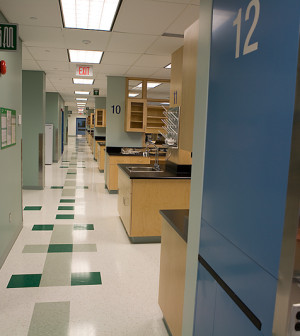- Could Your Grocery Store Meat Be Causing Recurring UTIs?
- Are You Making This Expensive Thermostat Error This Winter?
- Recognizing the Signs of Hypothyroidism
- 10 Strategies to Overcome Insomnia
- Could Artificial Sweeteners Be Aging the Brain Faster?
- Techniques for Soothing Your Nervous System
- Does the Water in Your House Smell Funny? Here’s Why
- Can a Daily Dose of Apple Cider Vinegar Actually Aid Weight Loss?
- 6 Health Beverages That Can Actually Spike Your Blood Sugar
- Treatment Options for Social Anxiety Disorder
Was Beethoven Composing From His Heart?


A heartbeat disorder may have influenced parts of composer Ludwig van Beethoven’s greatest works, researchers say.
“His music may have been both figuratively and physically heartfelt,” essay co-author Dr. Joel Howell, a professor of internal medicine at the University of Michigan Medical School, said in a university news release.
The deaf composer has been linked with numerous health woes, and historians have speculated that the composer may have had an arrhythmia — an irregular heartbeat. Now, a team that included a musicologist, cardiologist and medical historian suggest that the rhythms of certain sections of Beethoven’s most renowned pieces may reflect the irregular rhythms of his heart.
“When your heart beats irregularly from heart disease, it does so in some predictable patterns. We think we hear some of those same patterns in his music,” Howell explained.
“The synergy between our minds and our bodies shapes how we experience the world. This is especially apparent in the world of arts and music, which reflects so much of people’s innermost experiences,” Howell said.
Cardiac arrhythmia causes the heart to beat too fast, too slow, or with an irregular rhythm. Sudden, unexpected beat and key changes in some of Beethoven’s music appear to match this variation in heart rhythm, the researchers said.
The study authors also said that Beethoven’s hearing loss might have heightened his other senses and made him even more aware of his heartbeat.
The essay was published in the journal Perspectives in Biology and Medicine.
There is no way to know for certain whether Beethoven, who died in 1827, had cardiac arrhythmia. But the compositions analyzed by the researchers “may be ‘musical electrocardiograms,’ the readout of modern heart rhythm testing equipment,” Dr. Zachary Goldberger, a cardiologist at the University of Washington School of Medicine and lead author of the essay, said in the news release.
“While these musical arrhythmias may simply manifest Beethoven’s genius, there is a possibility that in certain pieces his beating heart could literally be at the heart of some of the greatest masterpieces of all time,” he added.
More information
The American Academy of Family Physicians has more about arrhythmia.
Source: HealthDay
Copyright © 2026 HealthDay. All rights reserved.










